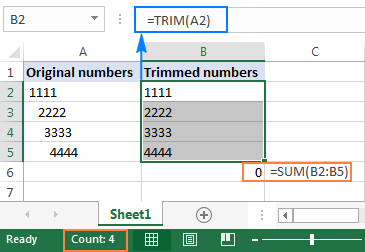

$result = mysql_query($sql, $connection) ĭie("Database query failed: ". How can I do this? Seems like it should be easy but can't figure it out. But I need to trim() each item in the array. Apparently, the trim() function is only removing space from the beggining and end of the ENTIRE string. The only difference is the fact that there are spaces in the Orlando Magic stuff.
PHP TRIM NUMBERS CODE
Using this code below, the answer IS found if $userinput is any of the Miami Heat options, but it is NOT found if it's any of the Orlando Magic options. I then look for the user entered answer ($userinput, which has trim and strtolower run on it) in the array. I run this code to bring back the answers data (all acceptable answers) in an array. *Notice how sometimes there are leading or ending spaces (i.e there is a space before "magic" but NOT a space before "miami"). I have a bunch of answers in a MySQL database in the form of. I think I found the cause, but need help fixing it. I'm able to maniupulate them as Strings everywhere else in the code.

The only thing I can guess is that for some reason the contents of the DB aren't being seen as Strings, even though they are, in fact, Strings. But it seems to me like the Trim command is supposed to exist to make it so that I don't have to do that. Am I supposed to sacrifice a goat first or something?īTW, if I go in and edit the database manually, I can strip out the spaces by hand, and everything works fine. It's simply NOT removing the white space, despite the fact that the entire description of what "Trim" does consists of "removes white space." It boggles my mind. I also tried (as per another tutorial example) setting a second variable trimming it, and using the second variable in the Echo, like so: I'm extremely OCD, and so if code doesn't work the way the documentation states, I freeze. Things like this make me want to pound spikes into my eyes, because there's just no logical way for me to work though this. Obviously, I'm leaving out a ton of code, but the important part is that it's not stripping the white space. $string: This is the desirable string you want to filter with a special character.I'm using the following code to attempt to strip white space from my search results:.On the other hand, if both $pattern and $replaceWith parameters are arrays, then it does the same as in the above condition but replace the specific indexed string of $pattern with its responding counter index of $replaceWith. If the $pattern parameter is an array and the $replaceWith parameter is a string, then the all $pattern parameter is replaced by the $replaceWith string. $replaceWith: In this, we give the character from which the $pattern string or array is replaced.$pattern: This parameter gives us a pattern for searching string or array of strings.This function preg_replace() contains few parameters as introduced below. Use the preg_replace() Function to Remove Special Character in PHP

This tutorial shows how we will use different functions to remove the special character from a string. These functions have their own syntax and parameters that can be used to remove the first character from a string. The most commonly used methods are the substr () function, ltrim and the substrreplace () function. In programming, sometimes, we want to remove some special characters from the string. In PHP, there are several ways to remove the first character from a string. Use the strtr() Function to Remove Special Character in PHP.Use the substr() Function to Remove Special Character in PHP.It accepts three parameters and returns a substring. The substr (string, offset, length) function is best suited for this job. Use the htmlspecialchars() and str_ireplace() Functions to Remove Special Character in PHP Just like trimming a specific set of characters, PHP also has dedicated functions to trim a specific number of characters.Use the trim() Function to Remove Special Character in PHP.Use the str_replace() Function to Remove Special Character in PHP.Use the preg_replace() Function to Remove Special Character in PHP.


 0 kommentar(er)
0 kommentar(er)
